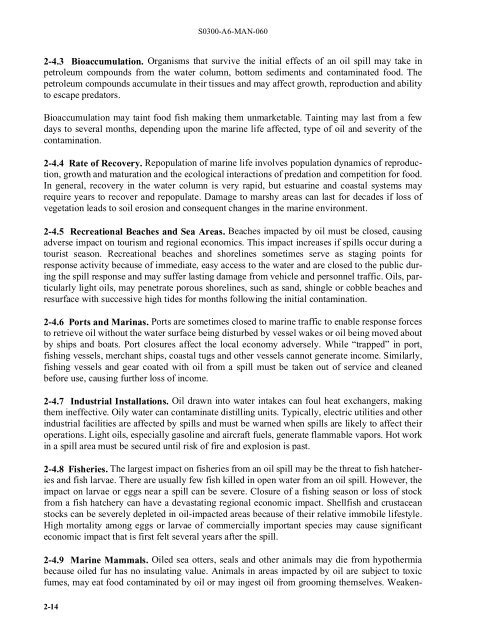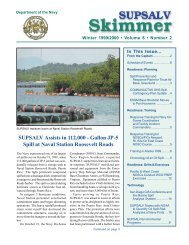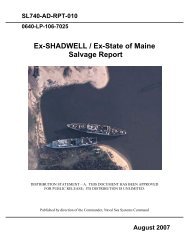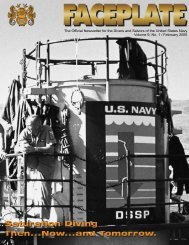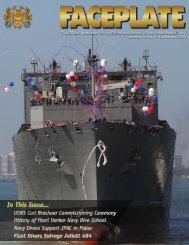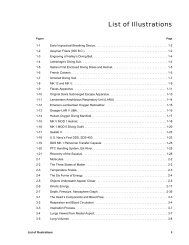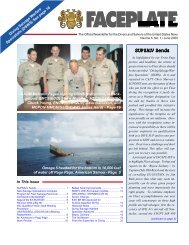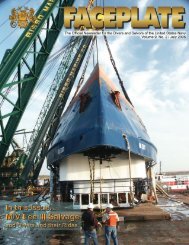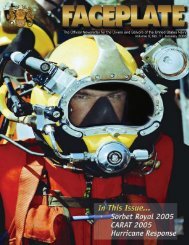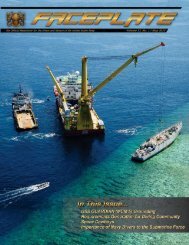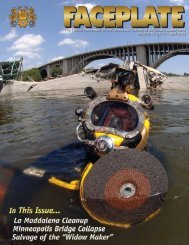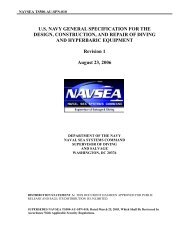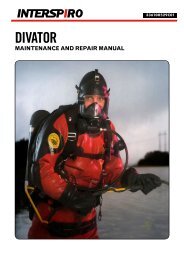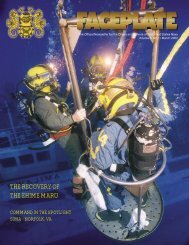U.S. Navy Ship Salvage Manual Volume 6 - Oil Spill Response
U.S. Navy Ship Salvage Manual Volume 6 - Oil Spill Response
U.S. Navy Ship Salvage Manual Volume 6 - Oil Spill Response
- No tags were found...
You also want an ePaper? Increase the reach of your titles
YUMPU automatically turns print PDFs into web optimized ePapers that Google loves.
S0300-A6-MAN-0602-4.3 Bioaccumulation. Organisms that survive the initial effects of an oil spill may take inpetroleum compounds from the water column, bottom sediments and contaminated food. Thepetroleum compounds accumulate in their tissues and may affect growth, reproduction and abilityto escape predators.Bioaccumulation may taint food fish making them unmarketable. Tainting may last from a fewdays to several months, depending upon the marine life affected, type of oil and severity of thecontamination.2-4.4 Rate of Recovery. Repopulation of marine life involves population dynamics of reproduction,growth and maturation and the ecological interactions of predation and competition for food.In general, recovery in the water column is very rapid, but estuarine and coastal systems mayrequire years to recover and repopulate. Damage to marshy areas can last for decades if loss ofvegetation leads to soil erosion and consequent changes in the marine environment.2-4.5 Recreational Beaches and Sea Areas. Beaches impacted by oil must be closed, causingadverse impact on tourism and regional economics. This impact increases if spills occur during atourist season. Recreational beaches and shorelines sometimes serve as staging points forresponse activity because of immediate, easy access to the water and are closed to the public duringthe spill response and may suffer lasting damage from vehicle and personnel traffic. <strong>Oil</strong>s, particularlylight oils, may penetrate porous shorelines, such as sand, shingle or cobble beaches andresurface with successive high tides for months following the initial contamination.2-4.6 Ports and Marinas. Ports are sometimes closed to marine traffic to enable response forcesto retrieve oil without the water surface being disturbed by vessel wakes or oil being moved aboutby ships and boats. Port closures affect the local economy adversely. While “trapped” in port,fishing vessels, merchant ships, coastal tugs and other vessels cannot generate income. Similarly,fishing vessels and gear coated with oil from a spill must be taken out of service and cleanedbefore use, causing further loss of income.2-4.7 Industrial Installations. <strong>Oil</strong> drawn into water intakes can foul heat exchangers, makingthem ineffective. <strong>Oil</strong>y water can contaminate distilling units. Typically, electric utilities and otherindustrial facilities are affected by spills and must be warned when spills are likely to affect theiroperations. Light oils, especially gasoline and aircraft fuels, generate flammable vapors. Hot workin a spill area must be secured until risk of fire and explosion is past.2-4.8 Fisheries. The largest impact on fisheries from an oil spill may be the threat to fish hatcheriesand fish larvae. There are usually few fish killed in open water from an oil spill. However, theimpact on larvae or eggs near a spill can be severe. Closure of a fishing season or loss of stockfrom a fish hatchery can have a devastating regional economic impact. Shellfish and crustaceanstocks can be severely depleted in oil-impacted areas because of their relative immobile lifestyle.High mortality among eggs or larvae of commercially important species may cause significanteconomic impact that is first felt several years after the spill.2-4.9 Marine Mammals. <strong>Oil</strong>ed sea otters, seals and other animals may die from hypothermiabecause oiled fur has no insulating value. Animals in areas impacted by oil are subject to toxicfumes, may eat food contaminated by oil or may ingest oil from grooming themselves. Weaken-2-14


